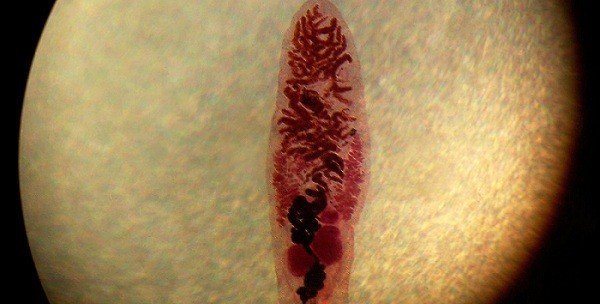Opisthorchosis

Opistorchosis is an infectious disease caused by helminths of the class of trematodes. The name of the parasitosis originates from the name of its causative agents, which are 2 types of flatworms Opisthorchis felineus and Opisthorchis viverrini.
The disease is characterized by a violation of the reflex functionality of the stomach and the intestinal tract, with stagnation of the bile fluid, mechanical damage to the bile ducts.
For the first, this type of parasitosis was described in medicine at the end of the 19th century. The helminths Opisthorchis felineus and Opisthorchis viverrini usually invade the bile ducts, gall bladder and pancreas.
Some types of domestic animals can also suffer from this disease.
The initial hosts of opistorches are various types of snails. After developing and multiplying in the snail’s body, these parasites fall into the water and are then ingested by fish. And domestic animals are most often fed raw.
A person can get sick from poorly cooked or insufficiently salted fish and thus develop the disease.
Because of this, outbreaks of opisthorchosis can appear in any place where conditions for the development and reproduction of parasites of this type have been created. This disease is especially common in areas where raw fish and snails are widely used for food.
What are the symptoms?
The incubation period is 2 to 4 weeks. After this period, the disease begins to manifest itself with an acute allergic reaction, with an increase in body temperature, headache, muscle and joint pain.
The patients develop asthmatic bronchitis and their lymph nodes increase. All these are signs of manifestation of the acute phase of opisthorchosis.
In some cases of milder course of the parasitic disease, it is accompanied by subfebrile temperature, general weakness and excessive sweating.
After 14 days, this helminthiasis passes into a latent /hidden form/, in which the liver is gradually affected and the patency of the bile ducts is disturbed.
Pathological changes are also observed in the patient’s central nervous system, which are manifested by dizziness, irritability, depressive moods, fatigue and insomnia.
This parasitic disease can also affect the human heart muscle. Patients report pain in the heart area, dystrophic changes in the myocardium are observed, and their heart activity is accelerated.
If the pancreas is severely affected, opisthorchosis manifests as acute pancreatitis, which may progress to cancer or cirrhosis of the liver and gallbladder.
Diagnosis
Diagnosis is established only and solely on the basis of the results of laboratory tests of fecal masses and duodenal contents. If during the analysis of the data obtained from the research, helminth eggs are found – the diagnosis is confirmed.
For the indirect symptomatology of the parasitic disease, the amount of eosinophils in the blood of the suspected patient can be used, which is an indicator of the process of formation of eosinophilic granulocytes in the bone marrow, as a protective reaction against foreign protein organisms.
Treatment of opisthorchosis
First of all, in this parasitic disease, therapeutic measures are taken to control the body’s allergic reaction. Anthelmintic preparations and antihistamines are prescribed.
It is also possible to prescribe the intravenous administration of calcium chloride and sedative drugs that are based on valerian, passionflower or bromine.



